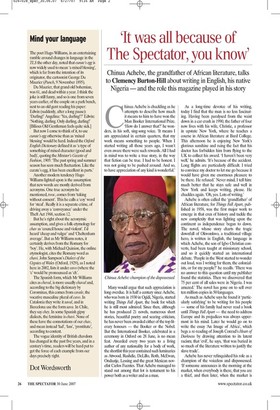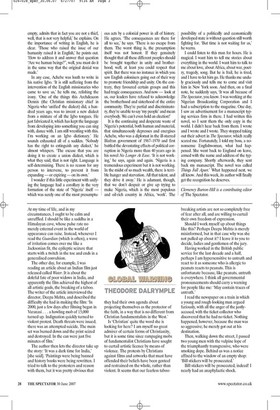'It was all because of The Spectator, you know'
Chinua Achebe, the grandfather of African literature, talks to Clemency Burton-Hill about writing in English, his native Nigeria — and the role this magazine played in his story /hinua Achebe is chuckling as he attempts to describe how much it means to him to have won the Man Booker International Prize.
'How do I answer that?' he wonders, in his soft, sing-song voice. 'It means I am appreciated in certain quarters, that my work means something to people. When I started writing all those years ago, I wasn't even aware there were such rewards. All I had in mind was to write a true story, in the way that fiction can be true. I had to be honest. I was not going to be pushed around. And so, to have appreciation of any kind is wonderful.'
Many would argue that such appreciation is long overdue. It is half a century since Achebe, who was born in 1930 in Ogidi, Nigeria, started writing Things Fall Apart, the book for which he is still most admired. Since then, although he has produced 21 novels, numerous short stories, beautiful poetry and searing criticism, he has never been awarded either of the top literary honours — the Booker or the Nobel. But the International Booker, celebrated in a ceremony in Oxford on 28 June, is no mean feat. Awarded every two years to a living author of any nationality for a body of work, the shortlist this year contained such luminaries as Atwood, Rushdie, DeLillo, Roth, McEwan, Ondaatje, Lessing and the great Mexican novelist Carlos Fuentes. That Achebe managed to stand out among that lot is testament to his power both as a writer and as a man.
As a long-time devotee of his writing, today I find that the man is no less fascinating. Having been paralysed from the waist down in a car crash in 1990, the father of four now lives with his wife, Christie, a professor in upstate New York, where he teaches a course in African literature at Bard College. This afternoon he is enjoying New York's glorious sunshine and ruing the fact that his doctor has forbidden him from flying to the UK to collect his award. 'I haven't been very well,' he admits. 'It's because of the accident. Long flights are particularly difficult. I tried to convince my doctor to let me go because it would have given me enormous pleasure to be there. He refused.' Never mind, I tell him. much better that he stays safe and well in New York and keeps writing, please. He chuckles again. 'Oh, yes. Lots of writing.'
Achebe is often called the 'grandfather' of African literature, for Things Fall Apart, published in 1958, was the first major work to emerge in that crux of history and tackle the new complexity that was lighting upon the continent as independence began to dawn. The novel, whose story charts the tragic downfall of Okwonkwo, a traditional village hero, is written in English, the language in which Achebe, the son of Igbo Christian converts, had been taught at missionary school, and so it quickly started an international debate. 'People in the West started to wonder out loud, was I writing for them, the colonialists, or for my people?' he recalls. 'There was no answer to this question until my publisher found the statistics. Then we discovered that 75 per cent of all sales were in Nigeria. I was amazed.' The novel has gone on to sell over ten million copies in 50 languages.
As much as Achebe says he found it 'particularly satisfying' to be writing for his people — some of his family had never read a book until Things Fall Apart — the need to address Europe and its prejudices was always uppermost in his mind. Later he would go on to write the essay 'An Image of Africa', which begs a re-reading of Joseph Conrad's Heart of Darkness by drawing attention to its latent racism; that 'evil', he says, 'that was buried in so much of the literature written to justify the slave trade'.
Achebe has never relinquished his role as a champion of the voiceless and dispossessed. 'If someone announces in the morning at the market, when everybody is there, that you are a thief, and then later, when the market is empty, admits that in fact you are not a thief, well, that is not very helpful,' he explains On the importance of writing in English, he is clear. 'Those who raised the issue of our humanity raised it in English,' he points out. 'How to address it and answer that question 'Are we human beings?", well, you must do it in the same way that the original denial was made.'
In any case, Achebe was loath to write in his native Igbo. 'It is still suffering from the intervention of the English missionaries who came to save us,' he tells me, relishing the irony. 'One of the things this Archdeacon Dennis (the Christian missionary chief in Nigeria who 'unified' the dialect) did, a hundred years ago, was to invent a new dialect from a mixture of all the Igbo tongues. He just fabricated it, which has kept the language from developing into something you can sing with, dance with. I am still wrestling with this. I'm working on an Igbo dictionary.' He sounds exhausted all of a sudden. 'Nobody has the right to extinguish any dialect,' he almost whispers. 'The excuse that you are doing it to create a union dialect, which is what they said, that is not right. Language is self-determining. There is no reason for any person to intervene, to prevent it from expanding — or expiring — on its own.'
I wonder if this little experiment with unifying the language had a corollary in the very formation of the state of 'Nigeria' itself — which was surely one of the most presumptuous acts by a colonial power in all of history. He agrees. The consequences are there for all to see,' he says. 'There is no escape from them. The worst thing is, the presumption itself was not honest. If they genuinely thought that all these different peoples should be brought together in unity and brotherhood, well, at least you could respect that spirit. But there was no instance in which you saw English colonisers going out of their way to promote friendship and unity. On the contrary, they favoured certain groups and this had tragic consequences. And now — look at us, our leaders have refused to acknowledge the brotherhood and sisterhood of the entire community. They're partial and discriminatory, they're unable to say 'my people' and mean everybody. We can't even hold an election!'
It is the continuing and desperate waste of Nigeria's potential, both human and material, that simultaneously depresses and energises Achebe, who was a diplomat in the ill-starred Biafi-an government of 1967-1970 and first battled the devastating effects of political corruption in Nigeria more than 40 years ago in his novel No Longer At Ease. 'It is not working,' he says, again and again. 'Nigeria is a tremendous experiment but it is not working. In the midst of so much wealth, there is terrible hunger and starvation. All that talent, and they drive it away.' He is adamant, though, that we don't despair or give up trying to make Nigeria, which is the most populous and oil-rich country in Africa, 'work'. The possibility of a politically and economically developed state is without question still worth fighting for. 'But time is not waiting for us,' he warns.
I could listen to this man for hours. He is magical. I want him to tell me stories about everything in the world. I want him to talk to me about love, about Africa, about war, poetry, tragedy, song. But he is frail, he is tired, and I have to let him go. He thanks me unduly graciously and tells me to come and visit him in New York soon. And then, on a final note, he suddenly says, 'It was all because of The Spectator, you know. I was working at the Nigerian Broadcasting Corporation and I had a subscription to the magazine. One day, I saw an advertisement for a manuscript typing services firm in there. I had written this novel, so I sent them the only copy in the world. I didn't hear back from them. I wrote and I wrote and I wrote. They stopped taking out their advert in The Spectator, which really scared me. Fortunately, I told my boss, a nononsense Englishwoman, what had happened. She went back to England on leave, armed with the name and address of the typing company. Shortly afterwards, they sent back my manuscript. The novel was called Things Fall Apart.' What happened next, we all know. And this week, its author will finally get the recognition he deserves.
Clemency Burton-Hill is a contributing editor of The Spectator.



















































































 Previous page
Previous page